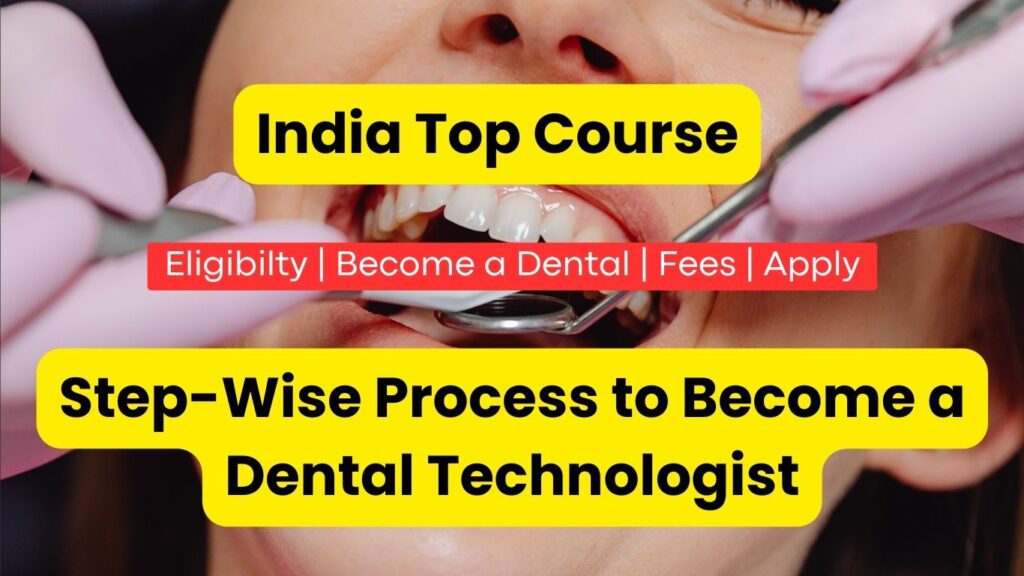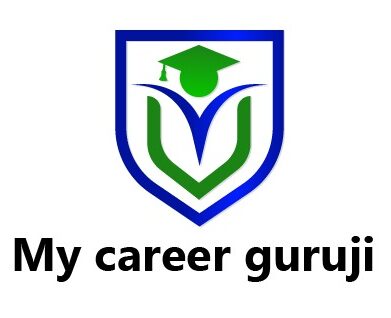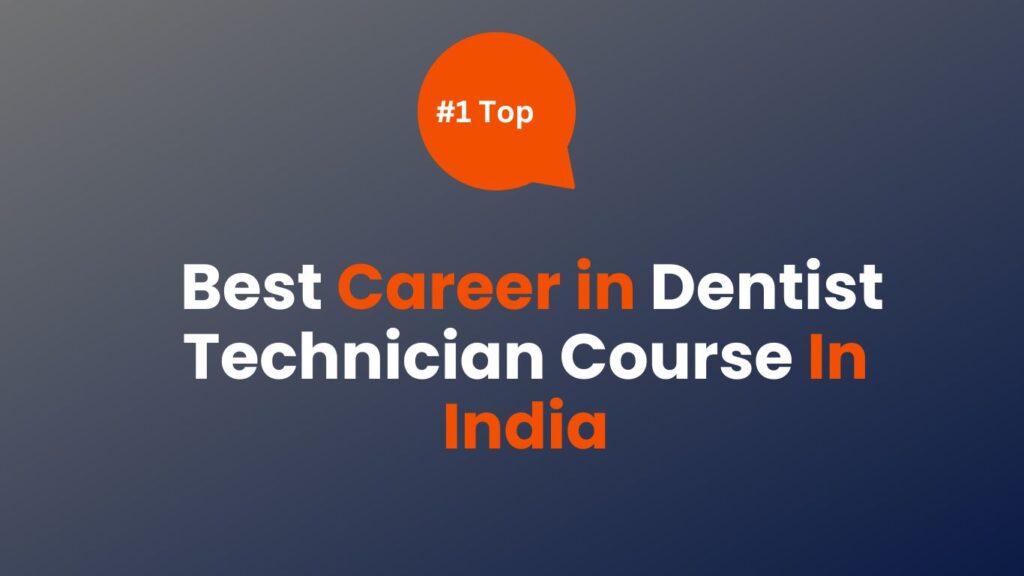The diagnosis, prevention, and treatment of diseases and disorders of the mouth are the main topics of dentist technician courses training.
It entails the examination of the mouth’s tissues, including the teeth, gums, and surrounding skin, as well as the diagnosis and management of diseases that affect the oral cavity and teeth.
For the prevention, diagnosis, and treatment of oral diseases and disorders, dentists are qualified medical doctors. They might work in a private practice, a hospital, a clinic, or some other type of healthcare facility.
Regular cleanings, fillings, extractions, root canals, orthodontic therapy, and cosmetic procedures like veneers and teeth whitening are some of the more common dental procedures and treatments.
Pediatric dentistry, periodontics, endodontics, and oral and maxillofacial surgery are some of the specialized fields in which dentists may practice.
What is Dental Technology?
Dental technology is a branch of dentistry that utilizes advanced tools and techniques to enhance oral health and create accurate dental restorations. It includes digital imaging, CAD/CAM technology, dental prosthetics, dental lasers, and 3D printing, all aimed at providing personalized and efficient dental care. By leveraging these innovations, dental professionals can offer improved patient experiences and optimal treatment outcomes, ensuring better oral health for individuals.
Best Key aspects in dental technology include:
- Digital Imaging
- Dental Prosthetics
- CAD/CAM Technology
- Orthodontics
- Digital Dentures
- Dental Lasers
- 3D Printing
- Dental Robotics
Table of Contents
Dentist Technician Course Eligibility Criteria
Depending on the specific course and the nation where it is being offered, the eligibility requirements for dentist technician course may change. But here are some typical prerequisites for dental programs.
Educational Qualification: Candidates must have successfully completed 10 + 2 with Physics, Chemistry, and Biology as required subjects.
Age Limit: The minimum age limit for dentist technician courses is usually 17 years.
Nationality: Candidates must be citizens of the country in which they are applying for the course.
Entrance Exams: Many dentist technician courses require candidates to appear for entrance exams, such as NEET (National Eligibility cum Entrance Test), to qualify for admission.
Minimum Marks: Student must have secured a minimum percentage of marks in their 10+2 or equivalent exam to be eligible for admission to dentist technician course.
Dentist Technician Courses Admission Process

The admission process for dentist technician courses may vary depending on the specific course and the country in which it is being offered. However, some common steps in the admission process is:
Application: Filling out the application form for the particular course is the first step in the admissions process. Depending on the institution, this could be done in person or online.
Entrance Exam: For admission to many dental programs, candidates must pass entrance exams like the NEET (National Eligibility Check Entrance Test). An appointment for counselling may come after the entrance exam.
Merit List: A merit list is created based on each candidate’s performance on the entrance exam. Typically, admission is open to applicants who score higher than the cutoff.
Counseling: The admissions-eligible applicants are contacted for counseling. The course and the institution a candidate wishes to enroll in must be chosen during counseling. At this point, they might have to pay a fee for counseling.
Document Verification: Candidates must submit their original documents, such as mark sheets and certificates, for verification. This is usually done at the time of counseling.
Payment of Fees: Once the candidate’s documents have been verified, they are required to pay the course fees to confirm their admission.
How to Become a Dentist Courses After 12th? | Best Step by Step Guide 2023-24
Dentist Technician Courses Curriculum and Subjects
Depending on the specific course and the nation in which it is being offered, the dental course curriculum and subjects covered may change. However, the following are some typical topics and subjects covered in dentist technician courses:
Anatomy: The head, neck, and oral cavity are all covered in this course, along with the structure and operations of the entire human body.
Physiology: The typical bodily processes, including those of the organs and systems, are covered in this subject.
Pathology: Disease diagnosis, prevention, and treatment are all covered under this subject, along with the study of illnesses and their causes.
Microbiology: In this subject, bacteria, viruses, and fungi are studied along with how they affect the human body.
Dental Materials: This topic focuses on the materials used in dentistry, including orthodontic, impression, and dental restorative materials.
Oral Medicine and Radiology: The use of radiographs in the diagnosis and treatment of oral diseases is covered in this course.
Pedodontics: Children’s dental health is covered in this topic, as well as pediatric dental disease prevention and care.
Periodontics: Studying the gums, bone, periodontal ligament, and other dental supporting structures as well as their diseases falls under the purview of this subject.
Prosthodontics: This topic includes dental prostheses’ design, creation, and fitting as well as tooth replacement.
Oral Surgery: This topic deals with surgical methods for treating dental issues, such as tooth extraction, cyst and tumor removal, and management of facial trauma.
Dentist Technician Courses Job Profiles
In both the public and private sectors, there are numerous job profiles available in the diverse field of dentistry. Here are a few typical job descriptions in the dental industry.
Dentist: A dentist is a member of the dental profession who offers oral disease and condition diagnosis, treatment, and prevention. They could be employed by public health agencies or in private practice.
Orthodontist: A dental specialist called an orthodontist specializes in the identification, avoidance, and correction of malocclusion, or improperly positioned teeth and jaws.
Endodontist: An endodontist is a dentist who specializes in identifying and treating problems with dental pulp and the tissues that surround tooth roots.
Periodontist: A periodontist is a dental specialist who focuses on the prevention, diagnosis, and treatment of periodontal diseases and conditions, including the supporting structures of the teeth, such as the gums and bone.
Oral and Maxillofacial Surgeon: A dentist who specializes in the diagnosis and treatment of diseases, wounds, and deformities of the face, jaws, and mouth is known as an oral and maxillofacial surgeon.
Dental Hygienist: A dental hygienist is a specialist who collaborates with dentists to deliver preventive dental care, including teeth cleaning, fluoride application, and x-rays.
Dental Assistant: In order to support dentists during patient examinations and procedures, dental assistants are dental professionals. They might be responsible for gathering supplies, helping with x-rays, and making appointments.
Dental Technician: A dental technician is a dental professional who works in a dental laboratory to construct dental prostheses, such as crowns, bridges, and dentures, based on the dentist’s instructions.
Dental Public Health Specialist: A dental professional who works with public health organizations to promote oral health and prevent oral diseases and conditions at the community level is known as a dental public health specialist.
Dental Technician Courses After 12th
After completing grade 12, students can choose from a variety of dentist technician courses. Following completion of their 12th grade education, students can enroll in some of the most well-liked dentist technician course available:
Bachelor of Dental Surgery (BDS): The five-year BDS program is an undergraduate dental program. It is intended to give students a solid foundation in the field of dentistry and to prepare them for a career as a dentist.
Diploma in Dental Hygiene: The focus of the one-year diploma program in dental hygiene is the prevention and management of oral diseases. The goal of this course is to equip students with the abilities and knowledge needed to work as dental hygienists.
Diploma in Dental Mechanics: The construction of dental prostheses like dentures, crowns, and bridges is the main topic of the one-year diploma program called “Diploma in Dental Mechanics.”. Students who complete this course will have the abilities and information required to work as dental technicians.
Diploma in Dental Operating Room Assistant: The Diploma in Dental Operating Room Assistant program is a one-year diploma program that focuses on giving students the abilities and information they need to support dentists during surgical procedures.
Bachelor of Dental Technology (BDT): The four-year BDT program is an undergraduate dental program. It focuses on the creation, production, and maintenance of dental prostheses like dentures, bridges, and crowns.
Diploma in Oral Health Care: A one-year diploma program called “Diploma in Oral Health Care” emphasizes both the diagnosis and treatment of oral diseases. The goal of this course is to equip students with the abilities and information needed to work as dental assistants.
Read More: ISRO Free Online Course For School Student With Certification
FAQs Regarding Dentist Technician Courses
Here are some frequently asked questions regarding dentist technician courses:
Q. What are the eligibility criteria for dental courses?
Ans: Depending on the particular course and the nation in which it is being offered, the prerequisites for dental courses may change. However, in general, applicants must have earned a 10+2 GPA with Physics, Chemistry, and Biology as their primary subjects. A minimum percentage of marks in these subjects may also be required for some courses when applying.
Q. What is the duration of dentist technician courses?
Ans: The duration of dental courses may vary depending on the specific course and the country in which it is being offered. In general, undergraduate dental courses, such as Bachelor of Dental Surgery (BDS), are of five years’ duration. Postgraduate dental courses, such as Master of Dental Surgery (MDS), are of three years’ duration.
Q. What is the career scope after completing a dental course?
Ans: Candidates can become dentists in private practice or for public health organizations after completing dental coursework. They can also work as dental hygienists, dental assistants, dental technicians, orthodontists, periodontists, endo dontists, oral and maxillofacial surgeons. Additionally, some candidates might decide to go into academia or dental research.
Q. How can I get admission to a dental course?
Ans: The specific course and the nation where it is being offered, the admissions procedure for dental programs may change. However, in general, applicants must show up for an entrance exam held by the relevant dental education authority. Candidates may also need to go through counseling or an in-person interview depending on the course.
Q. What are some of the subjects covered in dental courses?
Ans: The subjects covered in dentist technician course may vary depending on the specific course and the country in which it is being offered. However, some common subjects covered in dental courses are anatomy, physiology, biochemistry, microbiology, pathology, dental materials, oral medicine and radiology, pedodontics, periodontics, prosthodontics, and oral surgery.







